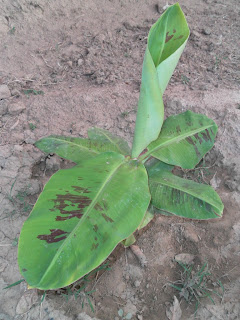Anna found this under a water container in the house; sharpie is there for perspective
Still wondering what we are up to? Understandable question- there is a stereotype of some Peace Corps Volunteers doing quite a bit of vegging and not much work. Well I can assure you, we don’t fall in this category, and nor do many of our fellow volunteers here. Life is HARD here. After posting a fair number of photos of our break weekends in the regional capitol, or our fantastic visit to the presidential palace, per suggestion from home (Margaret, I think you get credit?) it is time to give you a picture of our glamorous daily lives.
65% of our lives here are all about survival up to this point, honestly. Our actual work is nowhere near 40 hours per week yet, as our language is still somewhat limited and so are our relationships with villagers. But, if you are picturing a nice camping trip-esque life in the tropics with rice dinners and plenty of relax time, let me set your record straight. To really picture this, think about your daily routine, then substitute items and scenery for ours here in Africa.
MORNING ROUTINE
The nyegen and your morning bucket shower, the hole on the left is for shower water, the right is the toilet
Ameriki: Wake up, get out of bed, relieve yourself, shower, brush your teeth, get dressed, make some coffee and breakfast, and then get in your car and head to work.
Mali: Wake up and get out of your mosquito net tent, dismantle it. Go to the nyegen, our open-air latrine, and wash your hands afterward with a plastic teapot called a salidaga. Go get water (see WATER below). Pour yourself a bucket of water to take your shower, which is also done in the nyegen. Brush your teeth, many Malians use sticks but I continue do the brush and paste routine. Make some coffee (real coffee, thanks to packages from you!), ride your bike to the bakery to get a loaf of bread for breakfast- bread that is 24h+ old is generally moldy so you actually need to get this the day you want to eat it. Look in your fridge for breakfast, psyche, no power=no refrigeration. I recommend peanut butter on bread for breakfast. Get dressed with your choice of outdoor clothes you brought from America or some Malian clothes. Put on copious amounts of sunscreen. Walk to work, sometimes in boots.
WATER
Coming back from the pump with 88lbs. of water
The pump
Ameriki: Want a drink, turn on the faucet. Want to flush the toilet, well, flush it. Want ice, open the freezer. Want to water your garden, turn on the hose.
Mali: Want water, go get it from the pump or well. We don’t have a well…yet (the landlord told us he would dig one after rainy season which will allow me to have a much bigger garden- happy face). We do have a neighborhood pump, and there is a little lady who sits in front of it collecting $1 fees per month or 25 cents to fill an individual bucket. To get your water, you need to buy a 20 liter empty cooking oil plastic container from the butiki for $1. After cleaning these with soap and sand, you can put this on your wheelbarrow, cart, or carry in your hands during rainy season. 1 liter of water converts to 2.2 pounds (physics-inclined brothers, this probably depends on the temperature, right?) which means that carrying two of these is about 88lbs. When you return, you can put some of this in your water filter and add a little bleach as an extra giardia-killing measure, and after 15 minutes drink away. The remaining water in your plastic containers is for bathing, flushing, washing hands, washing clothes, washing dishes, and watering plants. If you want ice, you can go look for the ice lady in the center of town who has a cooler of frozen baggies of water that have been transported into town from a big city down the road.
GOING TO THE STORE
Neighborhood butiki and the cashiers for the morning
Ameriki: Drive your car to the supermarket, Target, etc. and purchase away.
Mali: There are one room sheds, called a Butiki (Boutique said with a Malian accent) who have all of the soap, cigarettes, tea, nescafe, bags of sugar, few loaves of bread, mini bags of cooking oil that once lived in your water container, and a few other random items. These all generally carry the exact same wares and can be found every 500 meters. If you want anything else you go to the town market, where YOU are the spectacle. You can eat whatever you bought in the market the previous day, as long as it is in-season. You will need to make frequent trips because food storage is next-to-impossible. There is one big market per week when you can get specialty items like those green peppers or bananas you have been coveting, but you should be ready to push and shove your way through the crowds and beware of aggressive old ladies.
I could keep going, but you would probably stop reading- transportation, animals, house repairs, seating, entertainment, etc. You can see how some seemingly mundane parts of the day take significant time and effort.
I will never take electricity, running water, and transportation for granted again… or maybe I will, but at least not for a 6 months after we come back to Ameriki.
-----
A couple extra unrelated photos:
Storm rolling in, first dust, then rain
The street in front of our house in rainy season
The street toward the pump
Buses that we take to the regional capitol, I think they were purchased from greyhound 50 years ago



























